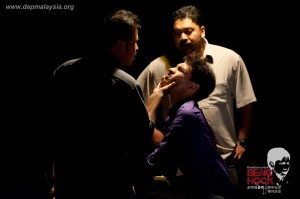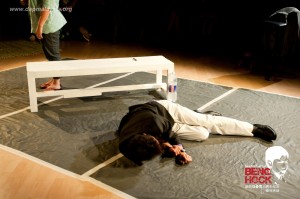by Syukri Shairi
A play of a tragedy: Rumah Anak Teater presents ‘Beng Hock’.
 “It was so real,” gasped a lady, teary-eyed. The show has just ended, and her voice came out frail, shaken as if she has witnessed the actual event revealing before her eyes. She is, apparently, the former colleague of the persona – the very central theme of the whole play – and like many of the late Teoh Beng Hock’s loved ones, the wound of the calamity remains fresh in their hearts.
“It was so real,” gasped a lady, teary-eyed. The show has just ended, and her voice came out frail, shaken as if she has witnessed the actual event revealing before her eyes. She is, apparently, the former colleague of the persona – the very central theme of the whole play – and like many of the late Teoh Beng Hock’s loved ones, the wound of the calamity remains fresh in their hearts.
‘Beng Hock’, rooting from the initiatives nurtured by Rumah Anak Teater, took a look at a story already dense with interpretations from varying angles: a tale of tragedy, conspiracy, suspicion and even revolt. The play’s attempt to dismiss the most extreme of these angles can be felt, yet for most of the time in ‘Beng Hock’, it is the wittily-driven elements of balance that drive the play.
Three years onwards after the incident, sparks of the controversies are still well and alive. With sentiments deeply revolving around the core content of the play, it is only fair to accept that the effort to translate this memory into a form of a play proved to be challenging.
Director Hariry Jalil related this context well. Setting off with a neat composition, he crafted the play along with producer Faisal Mustaffa’s careful touch – poignancy, it seems, was meant to be a part of the outcome.
However, for the peevish few, the idea to reenact the tragedy that once took place at the Selangor MACC Headquarters in Shah Alam, appeared alarming: the production is alleged to be receiving some scrutiny from certain factions of the authorities upon its initiation. “It’s unsurprising,” noted actor Azrul Azizi, who is playing one of the interrogation officials.
It has been strongly highlighted, nonetheless, that the play holds the Royal Commissions of Inquiry’s report as guideline. Faisal has acknowledged that the production team even ‘refrained from meeting the late Teoh’s family members’, in order to allow the interpretations offered by the play to appear ‘as neutral as possible’.
Despite the objectivities, the play displays no hesitation in allowing the subjective to prosper through silence. The 45-minute play offered a touch radical enough to redefine the space between silence and noise, interlacing anxiety with suggestions of despair.
In essence, it was a journey that witnessed the final ‘fight’ between the silent struggle of Teoh and the interrogation officials, whose ill-intentions are aimed at propagating fear and intimidation.
This fight, a flashback, was told through a fast-forward in time. The play touched down with a young man facing the dilemma of being recently unemployed, sitting on a bench at a park – attracting a stranger to relate a ‘much sadder story, happened 20 years ago’. The stranger, played by Nurbaya Hassan, argued that the young man’s problem is ‘nothing’ to be compared to Beng Hock’s: who lost to his fiancée, and a child in waiting.
Consequently, the mind of this young man, personified by newcomer Shufitri Sukardi, penetrated into the story – placing himself as Teoh, further embracing the fight that the late DAP aide had. Clarifying the backbone of the play, the interrogation scene departed from the brief composure by all parties existent in the beginning of the session, to the spiralling frustrations vividly shown by the officers towards Teoh.
The oft-disturbing wrath of the three officials were seen relenting, from time to time, by the intervention of the much soft-spoken ‘boss’, but not for long. The boss, portrayed by Amirul Effendi, seemed to be providing relief to the already drained out Teoh – it had been eight, long hours of continuous interrogation – through consoling words of diplomacy.
 Teoh’s firmness, however, got to all four of them, and what should have been a ‘tease’ led to the infamous fall. Returning to the present-day scene on the park bench, the baffled young man was given a parting reminder by the stranger: above all, he should be grateful that he is still alive.
Teoh’s firmness, however, got to all four of them, and what should have been a ‘tease’ led to the infamous fall. Returning to the present-day scene on the park bench, the baffled young man was given a parting reminder by the stranger: above all, he should be grateful that he is still alive.
But the message of the play definitely transcends that. The plot of the play provided a stern warning against complacency, and that Malaysians should do more besides sliding into the comforts of being grateful.
The solemnity reminded the audience of a darker shade of country. The play offered a space for the viewers to ponder about how power abuse is now invading even the most personal space of people – strong verbal accusations towards Teoh, immoral suggestions of his sexual life by the officials, and of course physical abuse, further solidifies this fact. Pray tell, how many more souls will be robbed with such distaste?
‘Beng Hock’ offers the choice to the audience to think about how much power we have in the wretched face of misused power. It refreshes our minds of how the notion of holding on to accountability and credibility stretches beyond the anger of injustice. It re-examines our priorities, pushing the juggle between our wants and needs to its edge – where to place a right mind, in the rage of insanity?
As the play concluded – occupying the gaps of the noises, residing within the silence –‘Beng Hock’ knocks hearts with a surging disquiet; of how the quest to uphold justice is, indeed, real. – The Rocket
‘Beng Hock’, a Rumah Anak Teater production, was staged at KLPac, Sentul Park, from 6 July to 8 July 2012. It was also staged in PenangPac on July 13 and July 14. More information at their Facebook page: http://www.facebook.com/pages/Rumah-Anak-Teater/129707770388491



